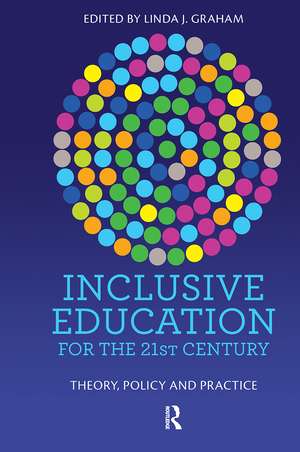Inclusive Education for the 21st Century: Theory, policy and practice
Editat de Linda Grahamen Limba Engleză Hardback – 31 mar 2021
Research evidence indicates the strategies that make schools inclusive for students with disability benefit all students. Yet many schools are still operating under twentieth-century models that disadvantage students, especially those with disability.
Inclusive Education for the 21st Century provides a rigorous overview of the foundational principles of inclusive education, and the barriers to access and participation. It explores evidence-based strategies to support diverse learners, including specific changes in curriculum, pedagogy and assessment practices, and the use of data. It addresses the needs of children with physical, sensory and intellectual disabilities, as well as those with complex learning profiles, including mental health issues.
With chapters from leading experts from Australia and the UK, Inclusive Education for the 21st Century addresses common issues in both primary and secondary schools. Underpinned throughout by research evidence, it is designed to assist educators to develop the deep knowledge required to make inclusive education a reality in all schools.
Preț: 903.32 lei
Preț vechi: 992.66 lei
-9% Nou
Puncte Express: 1355
Preț estimativ în valută:
172.85€ • 180.93$ • 143.87£
172.85€ • 180.93$ • 143.87£
Carte tipărită la comandă
Livrare economică 31 martie-14 aprilie
Preluare comenzi: 021 569.72.76
Specificații
ISBN-13: 9780367718435
ISBN-10: 036771843X
Pagini: 432
Dimensiuni: 156 x 234 x 31 mm
Greutate: 0.73 kg
Ediția:1
Editura: Taylor & Francis
Colecția Routledge
Locul publicării:Oxford, United Kingdom
ISBN-10: 036771843X
Pagini: 432
Dimensiuni: 156 x 234 x 31 mm
Greutate: 0.73 kg
Ediția:1
Editura: Taylor & Francis
Colecția Routledge
Locul publicării:Oxford, United Kingdom
Public țintă
Professional Practice & DevelopmentCuprins
Part I: Introduction and Fundamental Concepts
1 Inclusive education in the 21st century
2 Fundamental concepts of inclusive education
3 Does inclusion work?
Part II : Educators' Obligations under International and National Legislation and Policy
4 Inclusive education as a human right
5 Legislation, litigation and implications for inclusion
6 What is the NCCD and what does it mean for my practice?
Part III : Universal Evidence-based Strategies to Effectively Teach Diverse Learners in Supportive and Safe Inclusive Environments
7 Using assessment data to support student learning
8 Universal approaches to curriculum, pedagogy and assessment
9 Making adjustments to curriculum, pedagogy and assessment
Part IV : Developing Inclusive School Cultures through Inclusive and Ethical Practices
10 Developing inclusive school cultures through ethical practices
11 Putting students at the centre
12 Nurturing close student-teacher relationships
13 Promoting student wellbeing and mental health through social and emotional learning
14 Developing productive partnerships with parents and carers
15 Collaborating with colleagues and other professionals
16 Rethinking the use of teacher aides
Index
1 Inclusive education in the 21st century
2 Fundamental concepts of inclusive education
3 Does inclusion work?
Part II : Educators' Obligations under International and National Legislation and Policy
4 Inclusive education as a human right
5 Legislation, litigation and implications for inclusion
6 What is the NCCD and what does it mean for my practice?
Part III : Universal Evidence-based Strategies to Effectively Teach Diverse Learners in Supportive and Safe Inclusive Environments
7 Using assessment data to support student learning
8 Universal approaches to curriculum, pedagogy and assessment
9 Making adjustments to curriculum, pedagogy and assessment
Part IV : Developing Inclusive School Cultures through Inclusive and Ethical Practices
10 Developing inclusive school cultures through ethical practices
11 Putting students at the centre
12 Nurturing close student-teacher relationships
13 Promoting student wellbeing and mental health through social and emotional learning
14 Developing productive partnerships with parents and carers
15 Collaborating with colleagues and other professionals
16 Rethinking the use of teacher aides
Index
Notă biografică
Linda J. Graham is a Professor in the School of Early Childhood and Inclusive Education at the Queensland University of Technology. She is the Chair of the Academic Advisory Panel for All Means All: Australian Alliance for Inclusive Education and has published widely on inclusive education.
Descriere
An introduction to the foundational principles and evidence-based classroom strategies for effective inclusive education in both primary and secondary schools.
